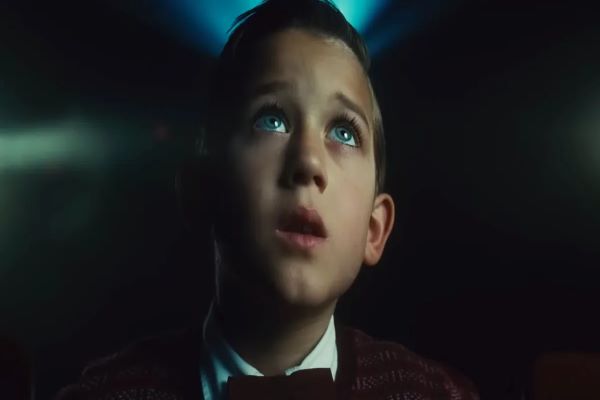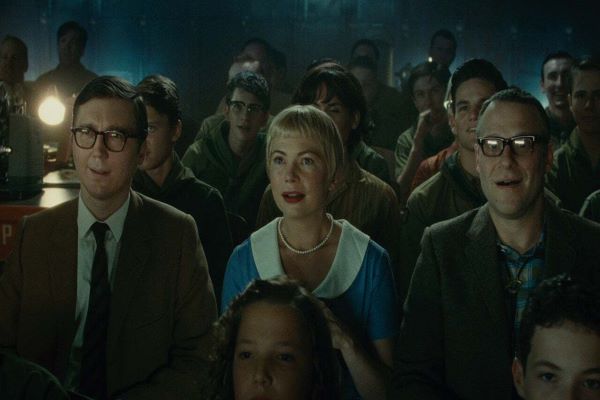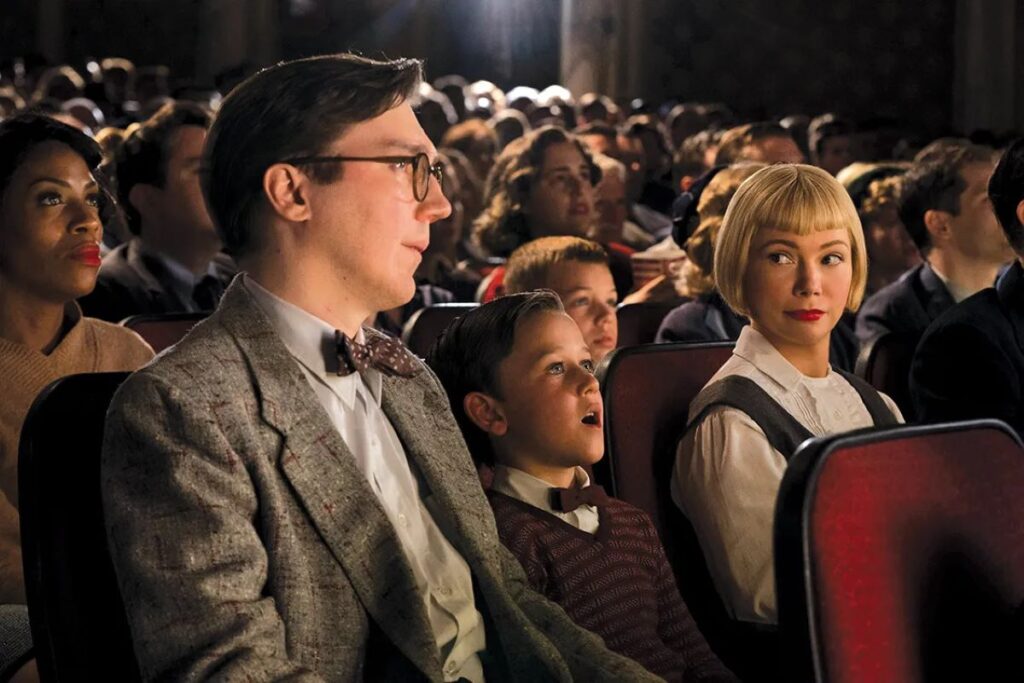Steven Spielberg is not an unknown name in the world of cinema. He is one of the most respected, celebrated, and successful filmmakers of all time. However, his life has not always been colorful or successful. He has gone through multiple ups and downs. Before his youth even started, his beloved family disintegrated in front of his eyes. In his new school in California, he was severely bullied, beaten, insulted, and attacked with anti-Semitism. So, his boyhood years were filled with many personal traumas and tragedies. In The Fabelmans, Steven Spielberg portrays his traumatized past for the very first time on the silver screen. Though the film is a work of fiction, it is largely inspired by Spielberg’s boyhood years. From adolescence to early youth, he always made films through which he discovered his family, familial secrets, and most importantly life. The Fabelmans is the most personal film that he has made to date.
The film starts with a Jewish couple Burt (Paul Dano) and Mitzi (Michelle Williams) Fabelmans taking their adolescent son Sammy to a movie theater in Haddon Township, New Jersey for watching Cecil B. DeMille’s The Greatest Show on Earth. A very young Sammy gets to see and feel the magic of cinema for the very first time. A train crashing scene in the movie casts such a deep, wonderful, and profound impact on him that he asks for a model train during Hanukkah and recreates the train crashing scene several times at home. His mother Mitzi observes this and encourages him to film the crash scene with his father’s 8mm camera. Sammy films it and his journey in the world of films starts. After this, he films very often with his younger sisters Reggie, Natalie, and Lisa.

After Burt gets a new job in Phoenix, Arizona in early 1957, the Fabelmans family relocates there. At Mitzi’s insistence, Burt’s best friend and colleague Bennie (Seth Rogen) relocates there as well. Years later, teenager Sammy (Gabriel LaBelle) makes his film Gunsmog casting his sisters as the actors. Then, he makes another film Escape to Nowhere based on World War II casting his friends as the actors. The Fabelmans family goes on a camping trip along with Bennie. Sammy films their entire camping trip. Mitzi’s mother passes away, which makes her utterly depressed. Burt buys Sammy editing equipment and asks him to make a film from the footage of their camping trip. Though Sammy already has another filming plan, he reluctantly agrees to his father’s suggestion.
Mitzi’s uncle Boris (Judd Hirsch), who is a retired actor and lion tamer, makes a surprise visit to the Fabelmans family. He cautions Sammy that family and art will tear him in two, they are junkies and art is their drug, art will give him crowns in heaven and laurels on earth, and it will tear his heart out and leave him lonely like a gypsy in a desert. During editing the camping footage, Sammy discovers that Bennie and Mitzi are having an affair. It hurts him so much that he keeps misbehaving with both Bennie and Mitzi for weeks. During a heated argument, Mitzi slaps Sammy. He shows her the footage of her affair with Bennie but promises to keep it secret. The next week, Burt gets transferred to Saratoga, California. Bennie stays back in Phoenix as he does not want to ruin Burt and Mitzi’s married life and the Fabelmans family. Before the Fabelmans family leaves Phoenix, Bennie buys Sammy a 35mm camera. Sammy reluctantly accepts it after Bennie allows him to pay for it but vows not to use it ever. However, Bennie returns the money to him.
In his new school in Saratoga, California, two fellow students Logan and Chad bully, beat, insult, and attack Sammy with anti-Semitism. Sammy falls in love with a devout Christian girl named Monica who tells him to film the School Ditch Day program and arranges her father’s 16mm Arriflex camera. The Fabelmans family moves from the rented house to their own house. However, quite unfortunately, Burt and Mitzi announce their divorce because of Mitzi’s severe depression and her affair with Bennie. This decision shatters the family and makes the Fabelmans heartbroken. Sammy tells Monica that they will shift to Hollywood after they complete their high school studies. However, Monica has her university plan and breaks up with Sammy, which leaves Sammy heartbroken again.
Sammy films School Ditch Day and elevates Logan but degrades Chad. Logan gets surprised by this unexpected depiction and protects Sammy from Chad. Mitzi urges and encourages Sammy to keep up his passion for filmmaking. Burt reluctantly approves of Sammy’s filmmaking passion. Sammy gets an offer from CBS to work on Hogan’s Heroes when the creative director of the show Bernard Feinn allows him to meet one of the greatest filmmakers in the world and one of Sammy’s major filmmaking inspirations Mr. John Ford. He gives Sammy lessons regarding film framing. Once the meeting gets over, an utterly overjoyed and amazed Sammy leaves the studio compound while the camera adjusts the frame capturing the horizon from the center to the bottom of the screen as per Mr. Ford’s advice.

Opening up private life and personal secrets to the world is never easy for an individual. It is an extremely difficult task, especially for a person like Steven Spielberg who has been respected and celebrated across the world for many years. No matter how successful a person is, each life has many unique stories that are very personal and hidden from the rest of the world. Mr. Spielberg is not an exception. However, carrying the emotional baggage all alone is not an easy task either. So, humans have portrayed their personal stories through artworks for ages, which offloads their emotional burden immensely. There is no doubt that Mr. Spielberg’s semi-autobiographical fiction film The Fabelmans provides him with an incredible opportunity to offload his emotional burden. Even though his sister Anne wrote a story titled I’ll Be Home way back in 1999 based on their family, Steven Spielberg could not make a film based on that story as he was worried that the film might hurt the sentiments of his parents. So, he is able to make this film only after they pass away.
It is heartbreaking for a sixteen-year boy to accept the separation of his parents. We all are born and grow up in a family. It serves the basic purpose of our existence and builds us with morals, values, and basic human emotions. We feel much loved, cared for, and most importantly protected. So, when a family disintegrates, it takes a hell lot of a toll on our minds. We get shattered as if our very basic existence is uncertain. Through The Fabelmans, Steven Spielberg portrays his traumatized past and vividly shows how difficult it was for him to accept his parents’ separation. However, much like a mature adult, he accepted and dealt with this unfortunate incident. He deemed his parents as two distinct individuals and took his stand from a neutral point of view. The same neutral view is reflected in this film as well. However, his suffering was enormous and he did not speak to his father for the next fifteen years as he took the blame for the separation on him. However, they reconciled later when he got to know the real incident.
In The Fabelmans, Steven Spielberg also shows how filmmaking can influence, inspire, and shape an individual from the dawn of life. Since recreating the train-crashing scene in The Greatest Show on Earth, he grew up and evolved in the midst of filmmaking and it became his deeply personal world. He made multiple amateur films as an adolescent. For his film The Gunsmog, he cast his own sisters. He cast his friends for the film Escape to Nowhere based on World War II. From adolescence to early youth, Spielberg’s journey as a filmmaker is depicted in this film. His path may be full of ups and downs, but it is never short of a very deep passion that has made him who he is today. Even he caught his mother’s affair with his father’s best friend through filming. He stopped getting bullied and attacked by glorifying one bully and vilifying the other. Throughout his life, cinema means Spielberg and Spielberg means cinema.
The Fabelmans will always be remembered for the last scene when young Spielberg gets an opportunity to meet one of the greatest filmmakers ever and his major filmmaking inspiration Mr. John Ford who gives him some lessons regarding framing. He was awestruck by Mr. Ford’s personality. Even though he felt Mr. Ford’s words were a little rude, he realized the preciousness of Mr. Ford’s advice later in his life. So, when he comes out of the meeting and starts walking down the adjacent road to the studio, the camera adjusts the horizon from center to bottom following Mr. Ford’s advice.
Steven Spielberg shows in The Fabelmans how he was bullied, beaten, tortured, and insulted with anti-semitic abuses. anti-Semitism has been one of the worst forms of racism for centuries. The world saw its worst form in the holocaust during World War II which brutally murdered more than three million Jews. Such a painful experience can bring nightmares and trauma to any individual. It deeply affected Spielberg as well. However, he eventually got out of it using a few incredible filmmaking approaches.
Even though Steven Spielberg’s sister Anne wrote a story titled I’ll Be Home based on the Spielberg family way back in 1999, he did not make a film based on the story as he was worried that it might hurt the sentiments of his parents. He initiated the project after his parents passed away. Spielberg and his long-time collaborator Tony Cushner wrote the screenplay between October and December 2020. The screenplay is deeply personal as it captures Spielberg’s life in detail from adolescence to early youth.
The Fabelmans marks the magnificent cinematography by Janusz Kaminski. His camera incredibly captures both Spielberg’s dreamy cinematic world as well as his personal tragedies, trauma, and insults. Kaminski’s cinematography in some scenes adds an extraordinary dimension altogether. Sammy’s mother Mitzi looks like a celestial fairy when she dances in her nighty in front of her family and Bennie during the camping trip with the high-power car headlight behind her. A very young Sammy experiences the magic of cinema when he uses his palm as the screen and the film is projected on his palm. Kaminski’s camera captures the incredible views of sunny California. Spielberg’s childhood films are recreated in The Fabelmans with 8mm and 16mm cameras but he himself modified the camera angles for his initial films. The camera adjusts the frame from center to bottom as per the advice of Mr. John Ford to Spielberg.
Another important aspect of the film is John Williams’ emotional and nostalgic background score which mostly includes piano solos played by Joanne Pierce Martin. The background score also includes some classical orchestral music composed by legendary composers like Bach, Friedrich Kuhlau, Eric Satie, Muzio Clementi, and Joseph Haydn. John Williams also uses some contemporary pop songs like Walk On By by Dionne Warwick and Goodbye Cruel World by James Darren as per the coming-of-age mood of the film. After more than 2000 auditions, Gabriel LaBelle was selected to play the character of Sammy. He portrays the character with humor, pathos, inquisitiveness, and restraint. Young Spielberg’s passion for film is reflected in LaBelle’s efficient portrayal of Sammy. He indeed looks like the replica of young Spielberg in the film as he straightened his hair and practiced standing, talking, and smiling like Spielberg.
Judd Hirsch’s portrayal of Spielberg’s grand uncle Boris is short in length but incredibly powerful, especially his monologue. Granduncle Boris had a very strong artistic influence on young Spielberg as an upcoming filmmaker. Michelle Williams as a deeply emotional, vulnerable, and depressed lover, an encouraging mother, and a skilled pianist is extraordinary. Paul Dano and Seth Roggen justify their characters. Production designer Rick Carter has done an incredible job in building three sets in Haddon Township, New Jersey, Phoenix, Arizona, and Saratoga, California. Especially, Sammy’s house in Phoenix exactly matches Spielberg’s house there. Costumes too reflect the bygone era of the 1950s and 1960s. Spielberg’s sister Anne gave some jewelry to Julia Butters to portray the character of Reggie. Michelle Williams wore Spielberg’s mother Leah Adler’s bracelet. The Fabelmans received seven nominations at the 95th Academy Awards. It also received five nominations and won Best Motion Picture – Drama and Best Director for Steven Spielberg at the 80th Golden Globe awards.
